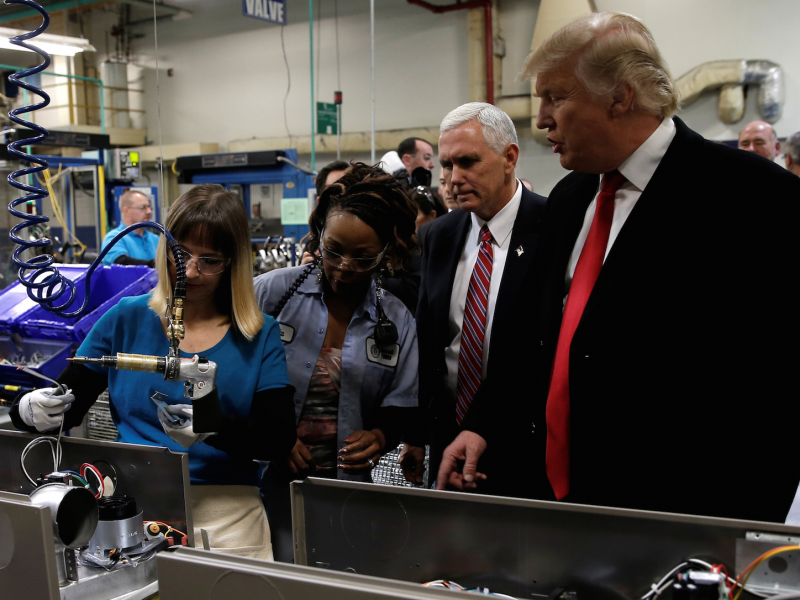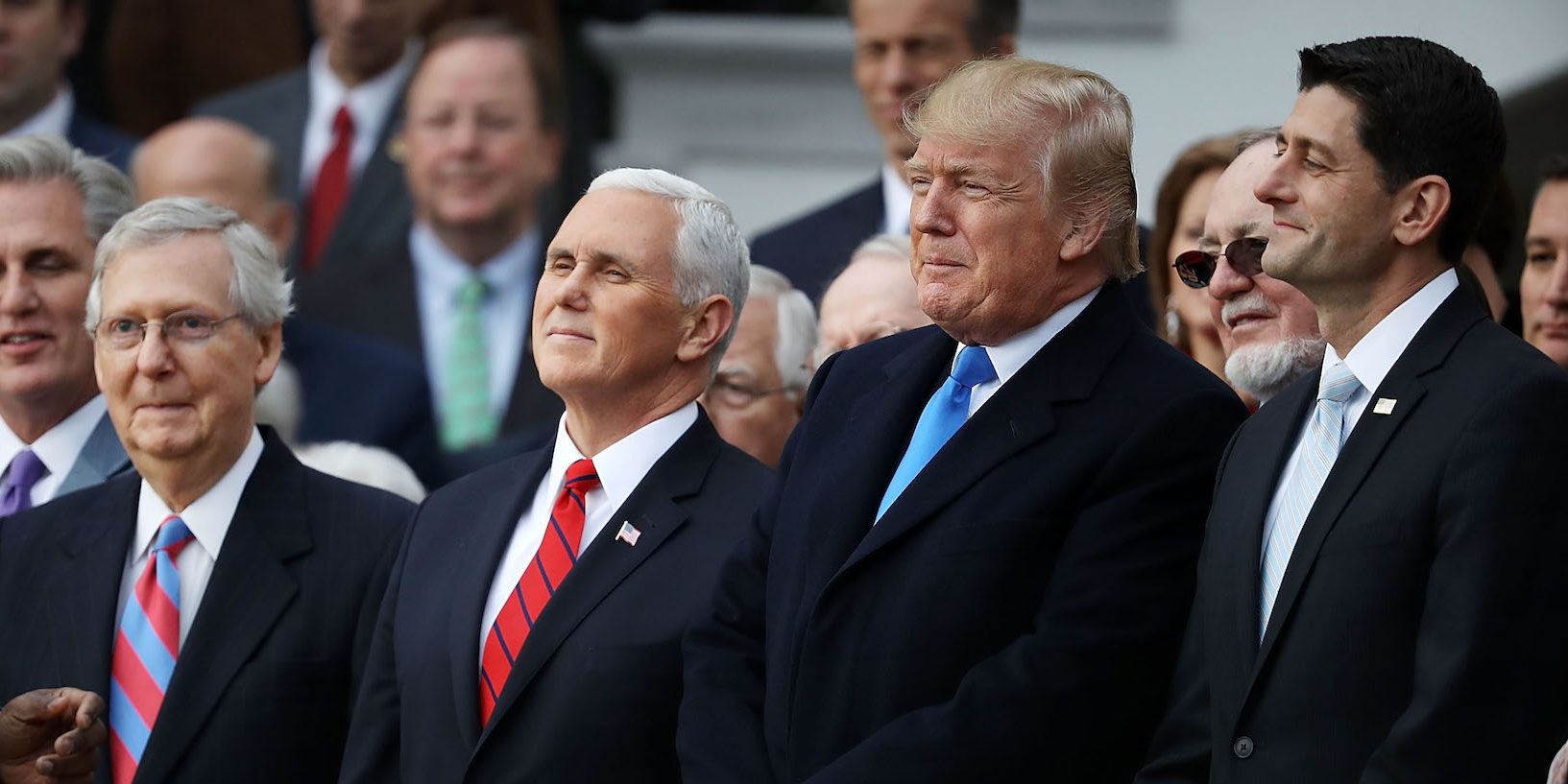- Congress passed the final version of the GOP tax bill on Wednesday.
- The bill will enact large changes to the tax code on both businesses and households.
- Experts predict that the bill will increase company profits, give a small boost to the US economy, cut taxes for most Americans, and cause the federal deficit to balloon.
The House passed the sweeping Republican tax bill on Wednesday, sending the bill to President Donald Trump for his signature before it becomes law.
The bill is set to enact huge changes to all corners of the US tax code. Its effects will likely reverberate throughout the US economy and households for years to come.
“We’re going to see something that’s going to be very special,” Trump said during a White House victory lap. “We’re bringing the entrepreneur back into this country. We’re getting rid of all the knots and all the ties, and you’re going to see. You’re going to see what happens. And ultimately, what does it mean? It means jobs, jobs, jobs, jobs.”
The economy
What does it mean? Most economists believe the bill will provide a boost to the US economy in the short-term. But the size and length of that boost may not be what Republicans have promised.
The Joint Committee on Taxation, the official scorekeeper in Congress, said the bill would boost growth the total size of the US GDP by 0.8 percentage points over the first 10 years the bill was passed. That breaks down to boost of around 0.08 percentage points of added to the GDP growth rate per year.
Goldman Sachs estimated that GDP growth would increase 0.3 percentage points above their baseline in 2018 and 2019. The analysts for the Penn-Wharton Budget Model said the annual boost would be between 0.06 points and 0.12 points.
Even the Tax Foundation, which typically is aggressive in its growth assumptions for tax cuts, said that the final bill will boost GDP growth by just 0.35 percentage point in 2018 - and that the effect would diminish in later years.
Nearly every analysis said the economic impact would fade. Goldman said the increased GDP could dissipate after 2020 and then actually become a drag on the economy. The JCT said that wouldn't happen until the second decade.
American households
Most American taxpayers will see a tax cut from the bill. How much of a cut depends on a variety of factors.
Overall, the Tax Policy Center estimated that the average American will get a tax cut of $1,610 in 2018 - and that every income bracket will get a tax cut. People in the middle quintile of earners would get a cut of $930 on average in 2018 and $910 by 2025. Overall, about 80% of people would see a tax cut in year one of the legislation, the center estimated.
But different income groups would see different benefits - and some none at all. In 2018, the TPC said, 4.8% of tax filers would see a tax increase, and around 8.9% of people would see a tax increase by 2025, which would shake out to around 16.3 million tax-filing units.
Over time, the TPC said, more benefits would skew toward wealthier Americans - 65.8% of the total federal tax benefit would to the top quintile of earners.
"What would these average tax cuts mean for American households? For middle-income people, an extra $900 would pay for about seven months of gas," said Howard Gleckman, a senior fellow at the TPC. "By contrast, those in the top 1% could pick up a nice Mercedes C Class Coupe with their $50,000+ average tax cut."
Republicans argue that such a predicted skew would be mitigated by a future Congress extending the individual cuts that are, for now, set to expire after 2025.
 Foto: source Mike Segar/Reuters
Foto: source Mike Segar/Reuters
Businesses
Businesses will receive a slew of benefits from the GOP tax bill - the biggest being a cut in the federal corporate tax rate to 21% from the current 35%.
Wall Street analysts expect a serious boost in profits. JPMorgan estimated that the tax bill would help boost the earnings per share of S&P 500 companies by $10 per share in 2018 - a giant step up that represents half of the total expected increase next year.
Analysts at Cowen Research Group estimated that just Amazon, Google and Facebook will save $4.5 billion in taxes in 2018 under the new tax code.
A big question is how businesses will spend the increase in profits. Republicans claim the increased profits will eventually be spent on capital investments like new factories and higher wages. Critics say it will primarily go to stock buybacks and shareholders.
After the bill's final passage on Wednesday, some major companies, like Comcast, Boeing, and AT&T, rushed to announce special bonuses and wage increases stemming from the tax bill.
"And that's because of what we did. So that's pretty good. That's pretty good," Trump said of AT&T's announcement that it would provide a $1,000 bonus to about 200,000 employees.
A recent survey by the Federal Reserve Bank of Atlanta showed that 59% of firms said they would not increase their planned hiring, while 39% said they would increase hiring somewhat or substantially. Another 46% said they would not change their capital investment plans, while 51% said they would. The report provides a boost to arguments that to use at least some of the newfound cash to stimulate the economy.
On the other hand, another survey by Bank of America and Merrill Lynch showed that 65% of firms polled said they would use the new gains to pay down debt, 46% would buy back stock, and just 35% would spend on capital expenditures.
The federal deficit
The "static" score of the bill - the amount of projected debt added when economic growth is not factored in - shows that the deficit would grow by about $1.5 trillion in the decade after the bill is implemented.
Republicans argue that the new economic growth from the bill will in turn generate more revenue, since larger incomes mean more taxes to collect.
Even so, experts do not believe the bill will totally pay for itself, as GOP leaders have claimed.
The most optimistic assumption by the Tax Foundation estimated that even with new growth, the bill would increase the deficit by $448 billion over 10 years. The JCT said the bill would add around $1 trillion to the deficit, while the TPC estimated that number would be a little under $1.3 trillion.
Joe Ciolli contributed reporting.

